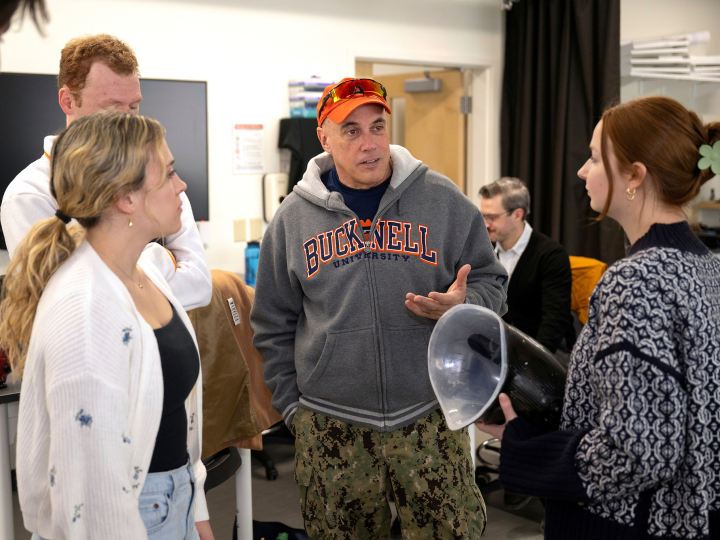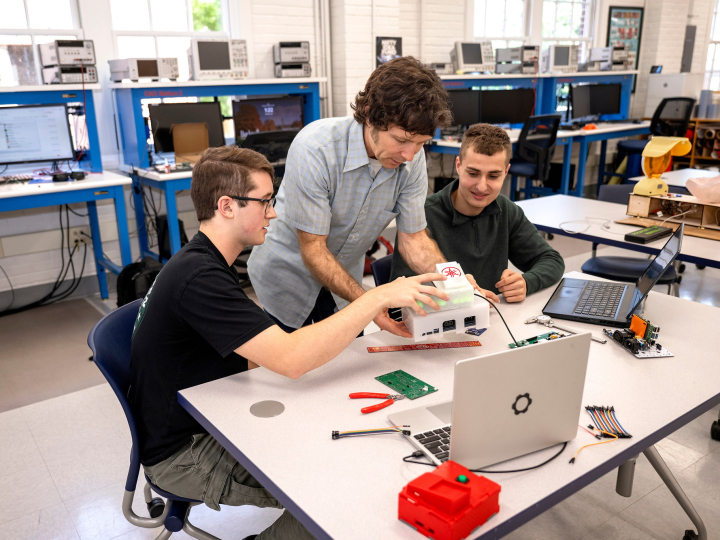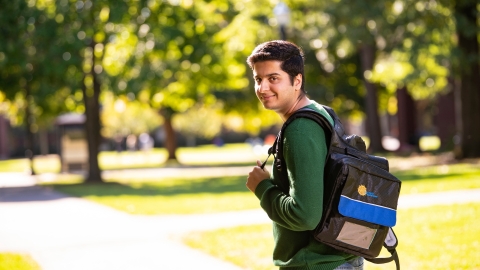
A Bright Idea: Bucknell Student, Professor Make Homework Safer for Refugee Students
October 17, 2019
Shehryar Asif '21 traveled to Lebanon to help make homework safer for refugee students there. Emily Paine, Communications
Working on homework shouldn't feel like a dangerous act. But when the sun sets on refugee camps in Lebanon, nightly blackouts force families to make a difficult choice.
In some families, students venture out into the dangerous streets to study under streetlights. In others, family members try to unlawfully patch their homes into the electric grid, risking death by electric shock.
Unsatisfied with that situation, a Bucknell student and professor traveled to Lebanon this summer armed not just with one solution but with backpacks full of them.
Shehryar Asif '21, an electrical engineering major from Lahore, Pakistan, joined Professor Amal Kabalan, electrical & computer engineering, on a 10-day trip from Lewisburg, Pa., to Beirut.
Each Solar Backpack, designed by Kabalan's SolarBrite Solutions initiative, includes a detachable battery pack that can be charged by the sun as students walk to and from the refugee camp's makeshift school. After dark, students can switch on the battery pack's power-efficient LED bulb and use its built-in USB port to charge their devices.
"I don't want a student not to do homework because they just don't have electricity at their house," Kabalan says. "In this century, no one on Earth should have that problem."
Kabalan began working on the Solar Backpacks as a Ph.D. student. When she got to Bucknell, Kabalan entrusted students to help with crucial components of the project, including fundraising (Jon Leung '17), marketing (Omar El-Etr '19) and testing (Nikki Lazarus '17). For the rollout, Kabalan worked with Asif, who led a two-day workshop inside the makeshift school.
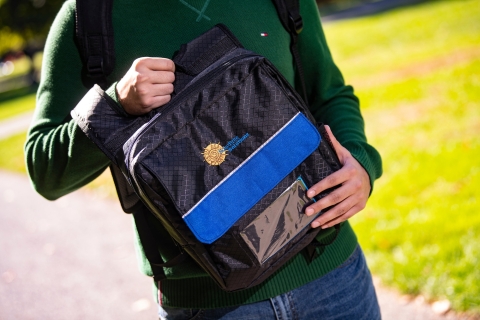
Each solar backpack has a clear pocket on the outside where students can place their solar-powered charger. As students walk to and from school, the sun's energy refills the battery. Emily Paine, Communications
Asif did more than teach the students how to use the devices to illuminate their homes or charge their phones. He delivered a larger lesson about protecting our planet.
"It was a way to provide them with a sustainable solution for the future, which also makes them curious about renewable energy," he says. "We don't want these refugee students to feel like they don't know what's happening and how the new technology works."
For his plan to implement an innovative solution to a real-world problem, Asif received a 2019 Davis Projects for Peace award. The award, presented to just 100 students each year, offers $10,000 for each recipient to use in completing a project that builds peace in the world.
Asif's effort wasn't the only Bucknell project honored with a Projects for Peace award. Nancy Ingabire Abayo '19 and Assumpta Gasana '20 also received $10,000 to help advance science education in their home country of Rwanda.
Bucknell was one of just 10 schools that received the maximum of two Projects for Peace awards in 2019.
A Powerful Lesson
Asif modeled his workshop on a typical Bucknell classroom experience. Instead of solely lecturing students about renewable energy, he let them experience it for themselves.
He started by letting them play with some solar-powered toy cars. That was an effective icebreaker and a clever way to illustrate how the sun's energy can be harnessed to power something useful.
"You're doing a hands-on activity in a way that you're helping solve some real-world problem, using sustainable energy as a tool," Asif says.
Next, he demonstrated how some energy resources are renewable while others aren't.
This was more difficult than it sounds. Though Asif is able to read and speak basic Arabic, he's not fluent in the language. Kabalan, a native Arabic speaker who was born in Lebanon, was available to translate the more difficult concepts. But as it turned out, Asif's lessons needed little translation.
"They weren't communicating via language, but they were communicating," Kabalan says. "He would, with symbols, teach them, and they would get it. It just worked."
Kabalan says this lesson was as valuable as anything Asif learns in the classroom.
"Employers, of course, look for engineers who can do the engineering part, but they look also for the engineer who can communicate and work in a team," she says. "When we talk to employers, they tell us that one of the strongest attributes of Bucknell students is they have those skills."
The Practical Side of Engineering
Kabalan, who first met Asif when he was a sophomore at Bucknell, says she enjoys connecting students with the "human side of engineering."
"A lot of places focus on the technical part and neglect the ethical part a little bit," she says. "So I feel like part of my mission here is to link those together."
Kabalan says people tend to think of engineering as extracting something from the earth. In most cases, the resources needed to power machines, construct bridges or build smartphones must be pulled from the ground.
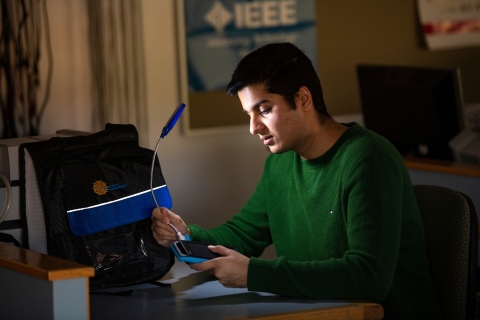
Shehryar Asif showed students how to use the device, which gave him a chance to discuss renewable energy. Emily Paine, Communications
"You're using the environment, and that's the way engineering has been done since the Industrial Revolution," Kabalan says. "Now we're asking, how can we do biomimicking? If you look at plants, they're using the resources, but they're integrated in a way that it doesn't have that negative effect of extraction and pollution. I see that's the way engineering is heading. How can we be part of this ecosystem, instead of just extracting from it?"
That's precisely what motivated Asif to pursue this project instead of a summer internship. Internships, he reasoned, are available any time. This was an opportunity both to help people in need and to gain hands-on experience in the renewable energy sector, a field where he hopes to make his career.
"When you're applying for a job, they want you to be able to lead a project," he says. "People can solve problems on paper but don't know how to put in the work. If I have an interview, and they say, 'So tell me why you're interested in solar technology,' I'm just talking to them about this whole experience."
